Related Research Articles

Henry Pelham was a British Whig statesman who served as Prime Minister of Great Britain from 1743 until his death in 1754. He was the younger brother of Thomas Pelham-Holles, 1st Duke of Newcastle, who served in Pelham's government and succeeded him as prime minister. Pelham is generally considered to have been Britain's third prime minister, after Robert Walpole and the Earl of Wilmington.

William Pulteney, 1st Earl of Bath, was an English Whig politician and peer who sat in the British House of Commons from 1707 to 1742 when he was raised to the peerage as the Earl of Bath by George II of Great Britain. He is sometimes represented as having served as First Lord of the Treasury and Prime Minister of Great Britain as part of the short-lived ministry in 1746, although most modern sources do not consider him to have held the office.
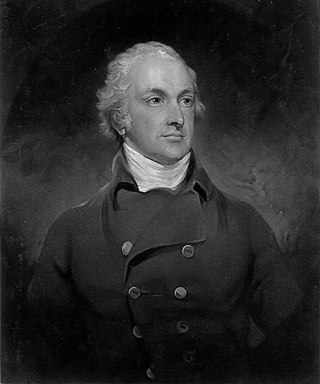
Thomas Pelham, 2nd Earl of Chichester PC, PC (Ire), FRS, styled The Honourable Thomas Pelham from 1768 until 1783, The Right Honourable Thomas Pelham from 1783 to 1801, and then known as Lord Pelham until 1805, was a British Whig politician. He notably held office as Home Secretary under Henry Addington from 1801 to 1803.

The Broad Bottom ministry was the factional coalition government of Great Britain between 1744 and 1754. It was led by the two Pelham brothers in Parliament, Prime Minister Henry Pelham in the House of Commons and the Duke of Newcastle in the House of Lords.
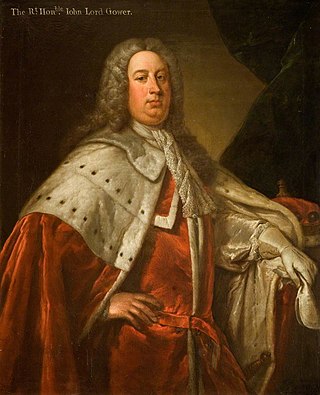
John Leveson-Gower, 1st Earl Gower, PC was an English Tory politician and peer who twice served as Lord Privy Seal from 1742 to 1743 and 1744 to 1754. Leveson-Gower also served in the Parliament of Great Britain, where he sat in the House of Lords as a leading member of the Tories, prior to switching his political affiliation and serving in various Whig-led government ministries until his death in 1754.
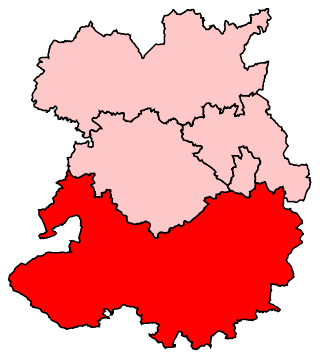
Ludlow is a constituency in Shropshire represented in the House of Commons of the UK Parliament since 2005 by Philip Dunne, a member of the Conservative Party.

Shrewsbury and Atcham is a constituency represented in the House of Commons of the UK Parliament since 2005 by Daniel Kawczynski, a Conservative.

Daniel Robert Kawczynski is a British Conservative Party politician.

Charles Townshend, 3rd Viscount Townshend, known as The Lord Lynn from 1723 to 1738, was a British politician who sat in the House of Commons from 1722 to 1723 when he was elevated to the House of Lords by writ of acceleration.
Shrewsbury was a parliamentary constituency in England, centred on the town of Shrewsbury in Shropshire.
Hertford was the name of a parliamentary constituency in Hertfordshire, which elected Members of Parliament (MPs) from 1298 until 1974.
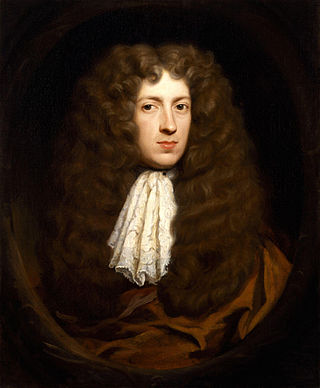
James Vernon was an English Whig politician who sat in the English and British House of Commons between 1679 and 1710. He was Secretary of State for both the Northern and the Southern Departments during the reign of William III.

From 1754 to 1756, the Duke of Newcastle headed the government of Great Britain. After the death of the previous prime minister, his brother Henry Pelham, Newcastle had formed a new administration of Whigs. He remained in power until 1756 when his government collapsed following the fall of Minorca and the fierce criticism that he had come under for his handling of the Seven Years' War that was engulfing Europe.
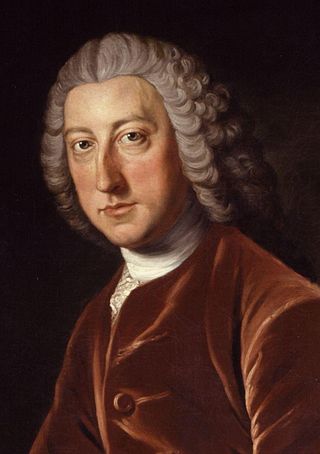
Between 1757 and 1762, at the height of the Seven Years' War, the Pitt–Newcastle ministry governed the Kingdom of Great Britain. It was headed by Thomas Pelham-Holles, 1st Duke of Newcastle, serving in his second stint as prime minister. The most influential and famous minister, however, was William Pitt the Elder, Secretary of State.

Shrewsbury is a market town, civil parish and the county town of Shropshire, England, on the River Severn, 150 miles (240 km) north-west of London. At the 2021 census, the parish had a population of 76,782.

Mark Davies is a British Roman Catholic prelate. He is the 11th Bishop of the Diocese of Shrewsbury in the Province of Birmingham, England.

Robert Aglionby Slaney was a British barrister and Whig politician from Shropshire. He sat in the House of Commons as a Member of Parliament for the borough of Shrewsbury for most of the period from 1826 until his death in 1862.
The 1913 Shrewsbury by-election was a Parliamentary by-election held on 22 April 1913. The constituency returned one Member of Parliament (MP) to the House of Commons of the United Kingdom, elected by the first past the post voting system.
George Butler Lloyd was a British banker and Conservative Party politician.
Charles Pelham of Brocklesby, Lincolnshire, was a British landowner and Tory politician who sat in the House of Commons for 28 years between 1722 and 1754.
References
- ↑ Stenton, Michael (1976). Who's Who of British Members of Parliament. Vol. 1. Hassocks: Harvester Press. pp. 305–306. ISBN 0855272198.